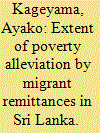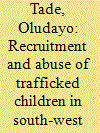|
|
|
Sort Order |
|
|
|
Items / Page
|
|
|
|
|
|
|
| Srl | Item |
| 1 |
ID:
080819


|
|
|
|
|
| Publication |
2008.
|
| Summary/Abstract |
After reviewing some of the available empirical literature on current trends of remittances and their economic impact on welfare of migrating countries, this study focuses on the case of Sri Lanka to demonstrate that workers' remittances may have both positive and negative consequences in home communities. Economically, remittances will benefit migrant households, particularly poorer ones, by increased income in the short term. However, they may sometimes cause negative social effects, particularly through disruption in family relations and also by creating a sense of relative deprivation in non-migrant communities. Therefore, migration and remittances are not the sole solution of poverty alleviation and appropriate policies also need to address unexpected adverse effects
|
|
|
|
|
|
|
|
|
|
|
|
|
|
|
|
| 2 |
ID:
134353


|
|
|
|
|
| Summary/Abstract |
This article examines the recruitment and transportation of internally trafficked children from Benue State in the north-central geo-political zone of Nigeria to Oyo State in the south-western zone of Nigeria. The study is essentially qualitative: with the aid of the snowball sampling technique, in-depth interviews (IDIs) were conducted with drivers, employers and trafficking agents in two recipient communities in Ibadan. The findings show that human rights abuses manifest at the recruitment, transportation and destination phases. The human rights abuses include the recruitment of underage children for domestic work outside their immediate family environments; transportation under inhumane conditions; restriction of movement at traffickers' ‘warehouses’; non-disclosure of amount payable for the services of domestic servants by agents/traffickers; exclusion of domestic servants in wage negotiations; and violence by employers. In view of these, there is a need for the National Agency for the Prohibition of Trafficking in Persons to strengthen its internal trafficking campaign.
|
|
|
|
|
|
|
|
|
|
|
|
|
|
|
|
| 3 |
ID:
178703


|
|
|
|
|
| Summary/Abstract |
The article deals with one of the under-researched themes of Indian history, which is the history of domestic servants. Thinking about servants raises two fundamental questions: who were they and what did domestic service mean? The identities of a servant as a contract wage earner or a person either belonging as a member or tied to the family through fictive/constructed claims of kinship were not mutually exclusive. Servants' identity existed in a continuum running from ‘free’ waged coolie on the one hand to ‘unfree’ slave on the other. The article traces the history of domestic servants along two axes: the slave–servant continuum, but, more importantly, the coolie–servant conundrum, which is a lesser-explored field in South Asian labour history or burgeoning scholarship on domesticity and household. Charting through the dense history of terminologies, the space of the city, and legal frameworks adopted by the Company state to regulate servants, it also underscores the difficulties of researching on a subaltern group that is so ubiquitous yet so fragmented in the archives. In order to reconstruct servants' pasts, we need to shake up our own fields of history writing—urban, labour, gender, and social—to discover servants’ traces wherever they are found. From serving as witnesses in courtrooms to becoming the subject of a city's foundational anecdote, their presence was spread across straw huts, streets, and maidans. Their work, defined through ‘private hire’, was the product of a historical process in which a series of regulations helped to intimatize the master-servant relationship.
|
|
|
|
|
|
|
|
|
|
|
|
|
|
|
|
|
|
|
|
|